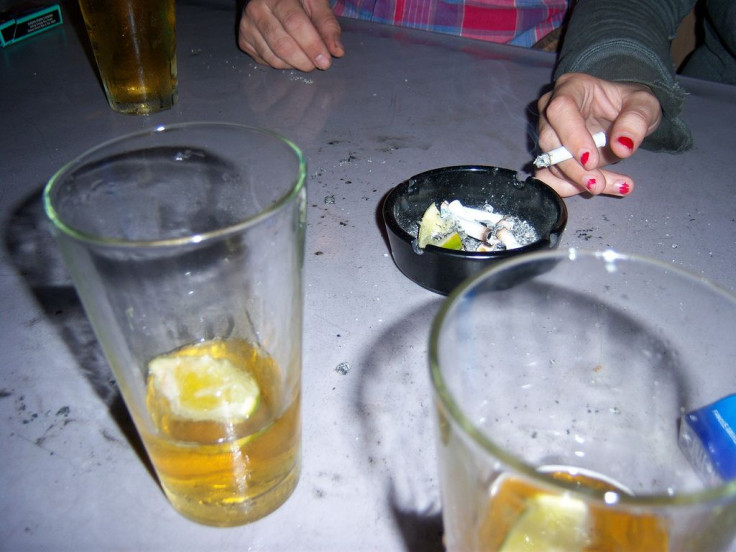Cigarettes And Alcohol: Science Finally Figures Out Why We Like To Smoke When We Drink

Only smoke when you drink? You’re not alone. Despite the rate of regular tobacco users decreasing, the number of self-confessed “social smokers” is on the rise, particularly among young women. But what is it about drinking that turns otherwise health-conscious individuals into overnight chainsmokers? According to a recent study, it’s because many drinkers crave the stimulant effect of nicotine, which helps offset the sleepiness alcohol induces.
The National Institutes of Health estimates that as many as 90 percent of alcoholics also smoke cigarettes, and even those without an alcohol dependency are known to light up “only when they drink.” Although this link between drinking and smoking has been widely acknowledged, scientists are not completely sure of what entices drinkers to light up in the first place.
In order to further investigate the biological reaction that drives drinkers to smoke, a team of researchers from the University of Missouri gave rats fitted with sleep-recording electrodes nicotine and alcohol. After observing the effects of the two drugs on the rats’ brains, the team came to an interesting conclusion: Nicotine’s stimulant effect helps to ward off the sleepiness caused by alcohol consumption.
Nicotine specifically affected the rat’s basal forebrain, an area of the brain associated with reflexes, learning, and most importantly, attention. Alcohol, being a depressant, inhibits the central nervous system. Therefore, it makes sense how this stimulation would help to counteract the sleep-inducing effects and increase alertness.
In addition to keeping drinkers awake, past research has also found nicotine can enhance the pleasurable effects of alcohol, further adding to the “alcohol high” and increasing our desire to drink more. Unfortunately, along with being two of the most widely used drugs, nicotine and alcohol are also some of the deadliest drugs. The World Health Organization estimates that each year, around six million deaths can be attributed to nicotine use while about three million trace back to excessive alcohol use.
There has been some progress in efforts to curb both smoking and drinking rates, however. A 2014 study, for example, found that instilling stricter tobacco taxes and smoke-free policies lowered overall smoking and drinking rates. Thakkar and his team hope that by identifying the physical reactions caused by drinking and smoking, they can help to further lower worldwide dependency on these products.
Source: Thakkar MM, Sharma R, Sahota P. Nicotine administration in the wake-promoting basal forebrain attenuates sleep-promoting effects of alcohol. Journal of Neurochemistry. 2015.
Published by Medicaldaily.com



























